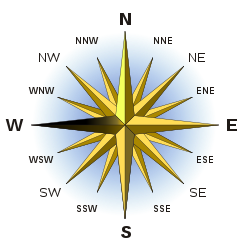West
This articleneeds additional citations forverification.(August 2019) |

Westis one of the four cardinal directions orpoints of the compass.It is the opposite direction fromeastand is the direction in which theSun setson theEarth.
Etymology
[edit]The word "west" is aGermanicword passed into someRomance languages(ouestin French,oestin Catalan,ovestin Italian,oestein Spanish and Portuguese). As in other languages, the word formation stems from the fact that west is the direction of the setting sun in the evening: 'west' derives from the Indo-European root*wesreduced from*wes-pero'evening, night', cognate with Ancient Greek ἕσπεροςhesperos'evening; evening star; western' and Latin vesper 'evening; west'.[1]Examples of the same formation in other languages include Latinoccidens'west' from occidō 'to go down, to set' and Hebrew מַעֲרָב (maarav) 'west' from עֶרֶב (erev) 'evening'.
West is sometimes abbreviated asW.
Navigation
[edit]To go west using a compass fornavigation(in a place where magnetic north is the same direction as true north) one needs to set abearingorazimuthof 270°.
West is the direction opposite that of theEarth's rotation on its axis, and is therefore the general direction towards which theSunappears to constantly progress and eventually set. This is not true on the planetVenus,which rotates in the opposite direction from the Earth (retrograde rotation). To an observer on the surface of Venus, the Sun would rise inthe westand set in the east[2]although Venus's opaque clouds prevent observing the Sun from the planet's surface.[3]
In a map with north at the top, west is on the left.
Moving continuously west is following acircle of latitude.
Weather
[edit]Due to the direction of the Earth's rotation, the prevailing wind in many places in themiddle latitudes(i.e. between 35 and 65 degreeslatitude) is from the west, known as thewesterlies.[4][5]
Cultural
[edit]The phrase "the West" is often spoken in reference to theWestern world,which includes theEuropean Union(also theEFTAcountries), the United Kingdom, the Americas, Israel, Australia, New Zealand and (in part) South Africa.
The concept of the Western part of the earth has its roots in theWestern Roman Empireand theWestern Christianity.During theCold War"the West" was often used to refer to theNATOcamp as opposed to theWarsaw Pactandnon-aligned nations.The expression survives, with an increasingly ambiguous meaning.
Symbolic meanings
[edit]In ChineseBuddhism,the West represents movement toward theBuddhaor enlightenment (seeJourney to the West). The ancientAztecsbelieved that the West was the realm of the great goddess ofwater,mist, andmaize.InAncient Egypt,the West was considered to be the portal to thenetherworld,and is the cardinal direction regarded in connection withdeath,though not always with a negative connotation. Ancient Egyptians also believed that theGoddessAmunetwas a personification of the West.[6]TheCeltsbelieved that beyond the western sea off the edges of all maps lay theOtherworld,or Afterlife.
InJudaism,west is seen to be toward theShekinah(presence) of God, as in Jewish history theTabernacleand subsequentJerusalem Templefaced east, with God's Presence in theHoly of Holiesup the steps to the west. According to theBible,theIsraelitescrossed theJordan Riverwestward into thePromised Land.InIslam,while in India, people pray facing towards the west as in respect toMecca,Meccais in the West-ward direction.
InAmerican literature(e.g., inThe Great Gatsby) moving West has sometimes symbolized gainingfreedom,perhaps as an association with the settling of theWild West(see also theAmerican frontierandManifest Destiny).
References
[edit]- ^"west | Origin and meaning of west by Online Etymology Dictionary".etymonline.Retrieved2018-03-03.
- ^"Space Topics: Compare the Planets".The Planetary Society.Archived fromthe originalon 18 February 2006.Retrieved12 January2016.
- ^Serge Brunier(2002).Solar System Voyage.Translated by Dunlop, Storm. Cambridge University Press. p. 40.ISBN978-0-521-80724-1.
- ^Glossary of Meteorology (2009)."Westerlies".American Meteorological Society. Archived fromthe originalon 2010-06-22.Retrieved2009-04-15.
- ^Sue Ferguson (2001-09-07)."Climatology of the Interior Columbia River Basin"(PDF).Interior Columbia Basin Ecosystem Management Project. Archived fromthe original(PDF)on 2009-05-15.Retrieved2009-09-12.
- ^Campbell, Joseph.The Mythic Image.Princeton University Press,1981.
External links
[edit] The dictionary definition ofwestat Wiktionary
The dictionary definition ofwestat Wiktionary
